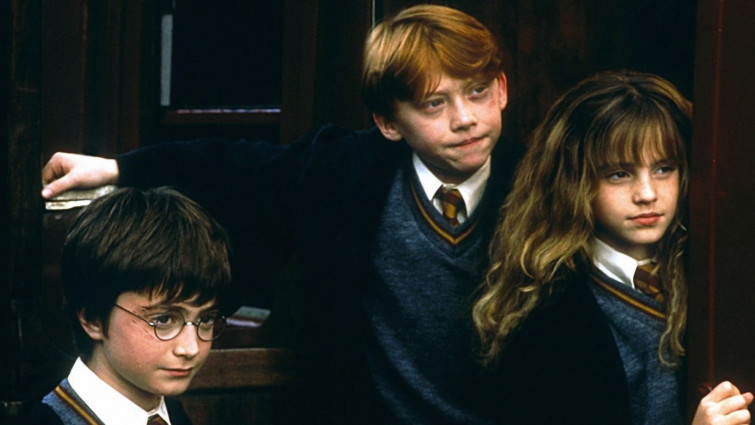

Member review

Harry Potter and the Philosopher's Stone
Harry Potter attends Hogwarts school for the first time as rumours surface proclaiming the return of the darkest wizard of them all,...
Certificate
Duration146 mins
Review by
-
 Archie, 17
Archie, 17 - 174 reviews
“Every child in our world will know his name.”
2021 marks the 20th anniversary of the release of “Harry Potter and the Philosopher’s Stone”, the first entry in one of the greatest franchises in cinematic history. Based upon the 1997 book by J.K. Rowling, this film brought Harry, Ron and Hermione (dare I say film’s most iconic trio) to the big screen and introduced audiences to Hogwarts School of Witchcraft and Wizardry, undisputedly the most beloved location in all of fiction. But with two decades and seven films (nine if you include the “Fantastic Beasts” spin-offs) separating us from this first adventure to the Wizarding World, does “Philosopher’s Stone” still hold up, or have we all been Confunded by our nostalgia?
I’ve wanted to review the “Harry Potter” movies for a very long time, but the prospect of breaking each one down and examining why they’re so good was a daunting one. For me, “Harry Potter” is more of a feeling, an emotional journey, than a series of books and films I can critique. The books stand alongside the MCU as my favourite collection of stories in all of media, with the films themselves following close behind. Of course, “Harry Potter and the Philosopher’s Stone” is not a perfect film, the CGI is poor by today’s standards, the pacing plods at points and some of the child actors haven’t quite settled into their roles yet. But honestly, I don’t care about the flaws in this particular entry because the characters and stories will always mean so much to me. The books had a profound impact on me when I encountered them for the first time. In a way, “Harry Potter” ruined reading for me because, with a few exceptions, I’ve never read anything that’s come close to the spellbinding nature of those seven epics. I’ve listened to the Stephen Fry-narrated audiobooks about fifty times each (at least) and “Harry Potter and the Half-Blood Prince” is my number one favourite book ever. So it’s important to note that this isn’t going to be an objective review of the film.
With all that rambling out of the way, let’s run into a wall, board the Hogwarts Express and discover what makes “Harry Potter and the Philosopher’s Stone” so magical.
One of the most fascinating aspects of the “Harry Potter” films is how each director puts his own stamp on the series, shaping the look and feel of each instalment according to their own creative sensibilities. As the franchise’s first director, Chris Columbus is certainly one of its most influential. He created the cinematic version of this world, cast the characters and established the template that would be adhered to for the next decade. Columbus’s style expertly captures the wonder of the wizarding world, the entire movie is bathed in a rich, honey-coloured glow that sets it apart from the darker follow-ups. “Philosopher’s Stone” is shot on film (rather than on digital), giving it a more traditional flavour. Some viewers may find the cinematography a bit flat here when compared to the stunning splendour of Alfonso Cuarón’s “Prisoner of Azkaban”, but I think the focus on characters and world-building were more important initially than pushing the visual boundaries of the series.
Columbus was adamant that his adaptations were faithful to the books, whereas other potential directors (an exhaustive list that most notably included Steven Spielberg) toyed with the idea of smashing multiple books together for the first film. As a book purist, I’ve always appreciated that Columbus’s two films stuck so closely to the source material, unlike “Goblet of Fire” and “Half-Blood Prince” that butchered the storylines and characters from their respective novels.
Amongst audience members who didn’t grow up with it, there exists a common criticism that “Harry Potter and the Philosopher’s Stone” isn’t as engaging as the later films, due to its lighter tone and younger demographic. Whilst I understand that this is all a matter of personal preference, in my eyes, the way the “Harry Potter” films mature with their audience is one of the series’ greatest strengths. It makes the overall arc of the franchise so satisfying as the tone darkens with the increasingly complex stories.
Harry’s wondrous world is the most enchanting location ever put to screen (I’m sure I’m one of the millions of people who wanted Hogwarts to be real). Hogwarts and Diagon Alley are fully-rounded characters in their own right, leading to the familiar sensation when revisiting the films that the viewer is returning home. Production designer Stuart Craig did an incredible job of bringing Rowling’s vision to life, from the spectacular Hogwarts castle to 4 Privet Drive, the sets here are some of the most detailed, impressive and instantly recognizable that I’ve ever seen.
Picking a favourite John Williams score is like trying to rank your best friends, but it goes without saying that his work on “Philosopher’s Stone” is some of his best. “Hedwig’s Theme” is the definition of the word magic, it’s beautiful, sweeping and perfectly encapsulates the sense of awe we feel when enveloped by the story. “Christmas at Hogwarts” is a charming track that sounds so inherently festive. The gut-wrenching “Leaving Hogwarts” is arguably one of Williams’s finest accomplishments, it’s an immensely moving piece that tugs on my heartstrings and gives me chills every time I hear it. It’s made all the more devastating when it returns for the 19 Years Later epilogue in “Deathly Hallows Part 2”; the music connects with the feelings of nostalgia and saying goodbye unlike anything else. Whether you’re watching the movie for the very first time, or for the fiftieth re-watch, John Williams’ magnificent score always heightens the quality of the film.
As important as all the technical elements of the film are, if “Philosopher’s Stone” had been miscast, the entire series would have been dead on arrival. Thankfully the filmmakers managed to assemble the finest ensemble of actors possible. For the most part, I can’t imagine anyone else filling these roles, almost every character is exactly how the books describe them.
The adults bring a great deal of gravitas to the proceedings, “Philosopher’s Stone” is a who’s-who of national treasures. From Maggie Smith playing Professor McGonagall, Julie Walters as Molly Weasley, Robbie Coltrane’s Hagrid and Alan Rickman in the role of Professor Snape, I cannot praise the cast enough for their accuracy to the source material and their brilliance across the franchise.
The fact that the crew were able to choose the right child actors to play these parts for a decade (many of whom had no acting experience) is an unparalleled achievement. Returning to this initial outing and comparing the fresh-faced cast to their later performances is always special. No other blockbuster franchise has ever managed to replicate the experience of watching a group of people grow up in front of the audience’s eyes. There’s something so pure about “Philosopher’s Stone” when compared to the more intense entries that succeeded it.
Daniel Radcliffe, Rupert Grint and Emma Watson were all pitch-perfect for their roles, they have excellent chemistry, making the character’s friendship more authentic. Their performances definitely improve as the movies continue, but their first time playing the trio is always enjoyable to watch.
As mentioned earlier, the pacing in “Philosopher’s Stone” is occasionally patchy. Because the story follows an entire school year, there are obviously several time jumps to progress the narrative, which means the momentum of the plot can slow down quite often. Also, as this movie is more concerned with atmosphere and building the foundations for future films, you’re enjoyment of “Philosopher’s Stone” will vary depending on your investment in the characters and settings. As someone who grew up with the series, I love revelling in the movie’s ambience, but more casual viewers may find the slow pace a problem.
Lastly, the only real criticism I can think of with “Philosopher’s Stone” is that the CGI has not aged well. The practical effects (such as certain shots with the troll) look fantastic, but the CG characters employed during the Quidditch match and some of the more dangerous stunts look like lumps of melted plastic. The movie is two decades old, so obviously it isn’t going to look photorealistic, but comparing the effects here to those found in other blockbusters of the era (or even its sequel that arrived one year later), the CGI in “Philosopher’s Stone” is disappointing.
In conclusion, “Harry Potter and the Philosopher’s Stone” is still just as whimsical, thrilling and entertaining as it was when I saw it for the first time eleven years ago. There’s just an indescribable something that makes this film so distinct. It’s like the cinematic incarnation of Christmas excitement when you’re young; it’s impossible to watch “Philosopher’s Stone” and not feel warm and fuzzy. Although it isn’t my favourite installment in the series, I defy anyone not to enjoy this movie on some level. “Harry Potter and the Philosopher’s Stone” isn’t just a brilliant start to a billion-dollar franchise, it’s one of the most important blockbusters of the century thus far and one of the best family films ever made. And to think that there are people out there that haven’t had the pleasure of watching it yet! “It's an outrage! It's a scandal!”